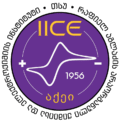TSU R.Agladze Institute of Inorganic Chemistry and Electrochemistry
The Institute was founded in 1956, separated from the Institute of Metallurgy and Mining, founded in 1946, and was initially called the Institute of Applied Chemistry and Electrochemistry of the Georgian Academy of Sciences, and later - the Rafiel Agladze Institute of Inorganic Chemistry and Electrochemistry of the Georgian Academy of Sciences.
The purpose of its establishment was to solve the problems of developing technologies for obtaining competitive products from the country's mineral resources. The technologies created at the institute were implemented in the form of large-scale production:
- The purpose of its establishment was to solve the problems of developing technologies for obtaining competitive products from the country's mineral resources. The technologies created at the institute were implemented in the form of large-scale production:
- A workshop for the electrochemical production of potassium permanganate was put into operation at the Rustavi Azot Industrial Complex (covering 1/3 of the USSR's needs);
- A pilot industrial plant for electrolytic manganese dioxide was launched at the Rustavi industrial complex “Azot”.
From 1984 to 2006 (i.e., until the fundamental change in the model of education and science organization in Georgia), the Institute operated a Qualification Council for awarding scientific degrees, which was the only one in the Caucasus region in the fields of electrochemistry, electrochemical technology, and inorganic materials technology. 85 candidate and 12 doctoral dissertations have been defended on it.
In accordance with the development, research has diversified into various directions: quantum-mechanical theory and experiment of charge transfer in chemical and electrochemical systems, metal-solution structure, adsorption of organic and inorganic compounds, electrochemical kinetics, electrocrystallization, thermochemistry, radiation-chemical transformations, synthesis of biologically active coordination compounds and their physical and chemical properties, creation of scientific prerequisites for obtaining valuable compounds from Georgian minerals, purification of chemical production effluents and utilization of toxic waste, etc.
Under the conditions of independent Georgia, the Institute has widely participated and currently cooperates within the framework of international projects and with the financing of foreign funds. Among them are already implemented and ongoing projects within the framework of the Seventh Framework Program of the European Union (FP7), the British Closed Nuclear Cities Program (CNCP), funded by the Swiss Science Foundation. In addition, partnership projects funded by the US Department of Energy and national laboratories (Livermore, Los Alamos) and private investors (Long Arc Technology – USA, G3C Technology – USA, Planetary Technology In – Canada), as well as with the support of the Georgian Innovation and Technology Agency and the World Bank. In addition, based on the research conducted at the institute, a plan for the development of hydrogen energy in the country was developed at the time and the Decree of the President of Georgia No. 1087 (September 4, 2003) “On measures to develop hydrogen energy in Georgia, deepen cooperation with international organizations and companies, and deepen integration processes” was issued.
The institute developed within the system of the Academy of Sciences until 2006, and then, within the framework of the above-mentioned change in the model of organizing education and science in Georgia, the LEPL Rafiel Agladze Institute of Inorganic Chemistry and Electrochemistry was established on its basis by the Resolution of the Government of Georgia of March 16, 2006 N58, which was reorganized by the Resolution of the Government of Georgia of July 9, 2010 N185 into an independent scientific-research unit of the LEPL Ivane Javakhishvili Tbilisi State University.
In 2015-2024, the Institute implemented a ten-year state scientific research program, within the framework of which annual budget program funding increased by 3.3 times and which covered many areas, namely: complex study of charge and energy transfer processes in irregular nano- and mesoscopic chemical and electrochemical systems using new methods of theoretical research; obtaining metal nanopowders; obtaining nanomaterials by explosion; development of heat-resistant, fire-resistant, corrosion-resistant, radiation-resistant materials; development of electrochemically active nanostructured cathode materials for new generation lithium-ion batteries; supercapacitors; fuel-type power sources; thermochemical studies; coordination and computational chemistry; catalysis; radiation chemistry; inorganic polymers; Electrochemistry of non-aqueous solutions; Electrolysis of melts; Obtaining competitive products by processing local minerals and mineral raw materials; Water purification and desalination; Solid waste utilization, etc.
A new multi-year program is currently being developed, the three main foundations of which will be modern energy, mineral and waste processing, and environmental problems.
The directors at various times were:
- Corresponding Member of the Academy Grigor Tatishvili (2007- )
- Academician Jondo Japaridze (1996-2006)
- Corresponding Member of the Academy Levan Japaridze (1980-1996)
- Apollon Avaliani (1972-1980)
- Academician Nikoloz Landia (1960-1972)
- აკადემიკოსი რაფიელ აგლაძე (1956-1960)
